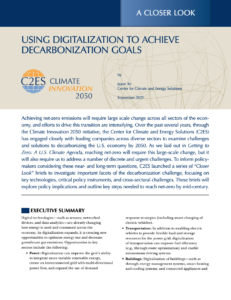Full Title: Using Digitalization to Achieve Decarbonization Goals
Author(s): Jason Ye
Publisher(s): Center for Climate and Energy Solutions (C2ES)
Publication Date: September 27, 2021
Full Text: Download Resource
Description (excerpt):
Digital technologies—such as sensors, networked devices, and data analytics—are already changing how energy is used and consumed across the economy. As digitalization expands, it is creating new opportunities to optimize energy use and decrease greenhouse gas emissions. Opportunities in key sectors include the following:
Power: Digitalization can improve the grid’s ability to integrate more variable renewable energy, create an interconnected grid with multi-directional power flow, and expand the use of demand response strategies (including smart charging of electric vehicles).
Transportation: In addition to enabling electric vehicles to provide flexible load and storage resources for the power grid, digitalization of transportation can improve fuel efficiency (e.g., through route optimization) and enable autonomous driving systems.
Buildings: Digitalization of buildings—such as through energy management systems, smart heating and cooling systems, and connected appliances and equipment—can improve the comfort of occupants while reducing energy use.
Industry: “Smart manufacturing” approaches can optimize energy and resource use, improve supply chain management, and allow for differentiation of products based on environmental attributes.
Oil & gas: Digitalization in the oil and gas sector can help with preventative maintenance, detect and reduce emission leaks, and improve the sector’s environmental footprint.
Agriculture: “Smart farming” approaches can reduce emissions-producing inputs (e.g., fertilizers) and water use, better manage livestock production and animal health, enable urban and vertical farming, and improve accounting of carbon sequestration.
Realizing the decarbonization potential of digitalization, however, will require grappling with a number of informational, usage, financial, regulatory, technical, infrastructure, security, and privacy challenges. These include lack of knowledge and capacity, high upfront capital costs, outdated regulatory models, lack of interoperable standards, the current semiconductor supply crunch, limited access to broadband, cybersecurity vulnerabilities, and concerns about compromised privacy and proprietary business information.
